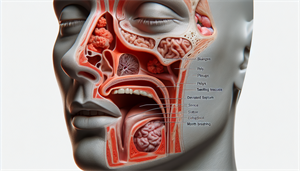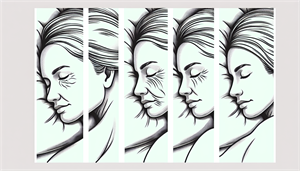Tired of waking up with a dry throat from sleeping with your mouth open? You’re not alone. This article cuts straight to the chase, providing you with practical steps on how to stop sleeping with mouth open - so you can enjoy the benefits of healthier, more restful sleep starting tonight.
Key Takeaways
-
Mouth breathing can lead to various health risks, including elevated stress levels, oral health issues, sleep disruptions, and general health problems such as facial deformities and cardiovascular risks.
-
Causes of mouth breathing often include nasal obstructions, allergies, sinus infections, and structural abnormalities such as a deviated septum, necessitating an accurate diagnosis and treatment plan for effective management.
-
Effective strategies to stop mouth breathing include clearing nasal passages, adjusting sleep positions, practicing breathing exercises, considering professional treatments like nasal strips or surgical options, and promoting healthy breathing habits in children.
The Dangers of Mouth Breathing

Though mouth breathing may appear harmless, it carries wide-ranging health implications. Chronic mouth breathing can lead to:
-
Elevated stress levels
-
Reduced energy
-
Compromised brain function
-
Potentially heightened blood pressure
These complications arise due to the absence of the benefits derived from nitric oxide production during nasal breathing.
Sleep Disruption
The quality of sleep is significantly impacted by mouth breathing. Mouth breathing during sleep can induce disturbances such as snoring, sleep apnea, and daytime fatigue.
The occurrence of snoring due to mouth breathing is attributed to the passage of air, including cold air, past the relaxed tissues in the throat, including the tongue and soft palate, resulting in vibrations and constriction of the airway.
Oral Health Issues
Oral health can suffer serious consequences from mouth breathing. A mouth breather can contribute to bad breath and dry mouth by reducing saliva production and creating a dry environment that fosters bacterial growth. This is why it’s important to address the issue and help mouth breathers improve their oral health.
Furthermore, it can lead to tooth decay by drying out the mouth and altering the natural bacteria balance, which can lead to gum disease and decay.
General Health Concerns
Beyond disrupting sleep and posing an oral health hazard, mouth breathing affects other aspects of health. It is linked to a range of general health concerns, including facial deformities in children, high blood pressure, and impaired brain function.
Moreover, mouth breathing has been linked to elevated blood pressure, reduced heart-rate variability, and heightened cardiovascular risks.
Identifying the Causes of Mouth Breathing

To find the right solution, it’s necessary to first understand the causes of mouth breathing. Typical causes include nasal obstruction, allergies, and sinus infections. These causes lead to an increase in nasal resistance, causing the individual to open their mouth for breathing due to the increased difficulty in airflow through the nose.
Nasal Obstruction
Predominantly, mouth breathing is caused by nasal obstruction. It can occur due to various factors such as:
-
Structural abnormalities
-
Allergies
-
Nasal polyps
-
Sinus infection
-
Nasal trauma
-
Inflammation
A stuffy nose can contribute to nasal obstruction by physically obstructing the nasal passages and causing mucosal inflammation.
Allergies and Sinus Infections
Mouth breathing can also result from allergies and sinus infections. Allergies like allergic rhinitis can cause mouth breathing by inflaming the nasal passages, leading to congestion that obstructs regular nasal breathing.
On the other hand, sinus infections result in chronic nasal congestion and inflammation in the nasal passages, obstructing nasal breathing and prompting mouth breathing as an alternative to dealing with nasal congestion.
Structural Abnormalities
Mouth breathing can be contributed to by structural abnormalities like a deviated septum or enlarged adenoids. These physical abnormalities can restrict nasal airflow, leading to mouth breathing.
Strategies for Stopping Mouth Breathing at Night

Incorporating the keyword “diagnose mouth breathing” into the text:
Identifying the causes of mouth breathing makes it easier to diagnose mouth breathing and implement preventive strategies. These strategies include clearing nasal passages, adjusting sleep position, and practicing breathing exercises.
Clearing Nasal Passages
To halt mouth breathing at night, one key strategy is to clear the nasal passages. This can be done using various methods such as:
-
Adding moisture to the air
-
Trying nasal irrigation
-
Taking a hot shower
-
Using a natural decongestant
-
Applying a warm compress
-
Increasing fluid intake
Adjusting Sleep Position
Mouth breathing can also be reduced by adjusting your sleep position. Sleeping upright or on your side and lying down in a lateral position can aid in maintaining open airways, keeping your mouth open to a minimum.
Elevating your head during sleep can potentially help in reducing mouth breathing by preventing the collapse of the airway.
Breathing Exercises
Another effective strategy to cease mouth breathing is practicing breathing exercises, such as nose breathing techniques. Exercises like alternate nostril breathing and diaphragmatic breathing can improve breathing patterns and promote nasal breathing during sleep.
Professional Treatments for Mouth Breathing

Professional treatments may be necessary in some cases. These treatments include nasal strips and dilators, mouth taping, and surgical options.
Nasal Strips and Dilators
Devices like nasal strips and dilators, designed to widen the nostrils or nasal passages, enhance air flow through the nose. These devices can be effective in reducing mouth breathing by decreasing air resistance in the nasal passages and improving airflow through the nose, as nose breathing adds resistance.
Mouth Taping
Another method to lessen mouth breathing is mouth taping. This technique involves taping the mouth shut before sleeping to encourage nasal breathing. However, it’s important to note that mouth taping carries potential risks such as compromised breathing, disrupted sleep, and the possibility of skin irritation.
Surgical Options
Surgical options may be necessary for severe cases of mouth breathing. Surgical interventions can include:
-
Surgical jaw expansion
-
Orthodontic treatments
-
Uvulectomy
-
Surgeries to operate on parts of the mouth and throat
Supporting Healthy Breathing Habits in Children

It’s crucial to teach children healthy breathing habits at a young age. This involves early intervention and promoting nasal breathing.
Early Intervention
In managing mouth breathing children, early intervention is key. Catching the problem early can help prevent potential complications before their growth spurt, improve sleep quality, and correct harmful oral habits.
Promoting Nasal Breathing
Through proper treatment, breathing exercises, and the encouragement of good habits, nasal breathing in children can be promoted. Techniques such as:
-
Teaching them to inhale through their nose and blow out through their mouth
-
Modeling nasal inhalation and blowing slowly
-
Practicing breathing through the nose several times a day
Can be beneficial for blood vessels.
Lifestyle Changes to Reduce Mouth Breathing
In reducing mouth breathing, lifestyle changes can also play a crucial role.
This includes quitting smoking and managing stress and anxiety.
Quitting Smoking
Inflammation and irritation of the nasal airway can result from smoking. Therefore, quitting smoking can reduce these symptoms and improve nasal breathing.
Managing Stress and Anxiety
Mouth breathing and other patterns can result from tightness in the muscles involved in breathing due to stress and anxiety. Therefore, managing stress and anxiety can help stop mouth breathing and prevent sleep disruption.
Summary
In conclusion, mouth breathing may seem harmless, but it can lead to a series of health issues if left unaddressed. By understanding the causes, symptoms, and potential treatments, one can take steps towards improving their health and quality of life.
Frequently Asked Questions
How can I stop sleeping with my mouth open at night?
To stop sleeping with your mouth open, try addressing the underlying cause such as nasal congestion, allergies, asthma, or sinus infections. Using a humidifier or nasal saline spray can also help reduce mouth breathing.
Can you train yourself to keep your mouth closed while sleeping?
Yes, you can train yourself to keep your mouth closed while sleeping by trying breathing exercises, sleeping on your side, using mouth taping, or chin straps to keep your mouth closed.
Can a mouth breather face be reversed?
No, chronic mouth breathing cannot be reversed to change adult facial structure, despite some claims on social media. Any potential changes would be very subtle, not dramatic.
What are the dangers of mouth breathing?
Mouth breathing can lead to sleep disruption, oral health issues, and various general health concerns, so it's important to address and correct it.
What causes mouth breathing?
Mouth breathing can be caused by nasal obstruction, allergies, sinus infections, and structural abnormalities. Addressing these underlying issues can help improve breathing through the nose.


